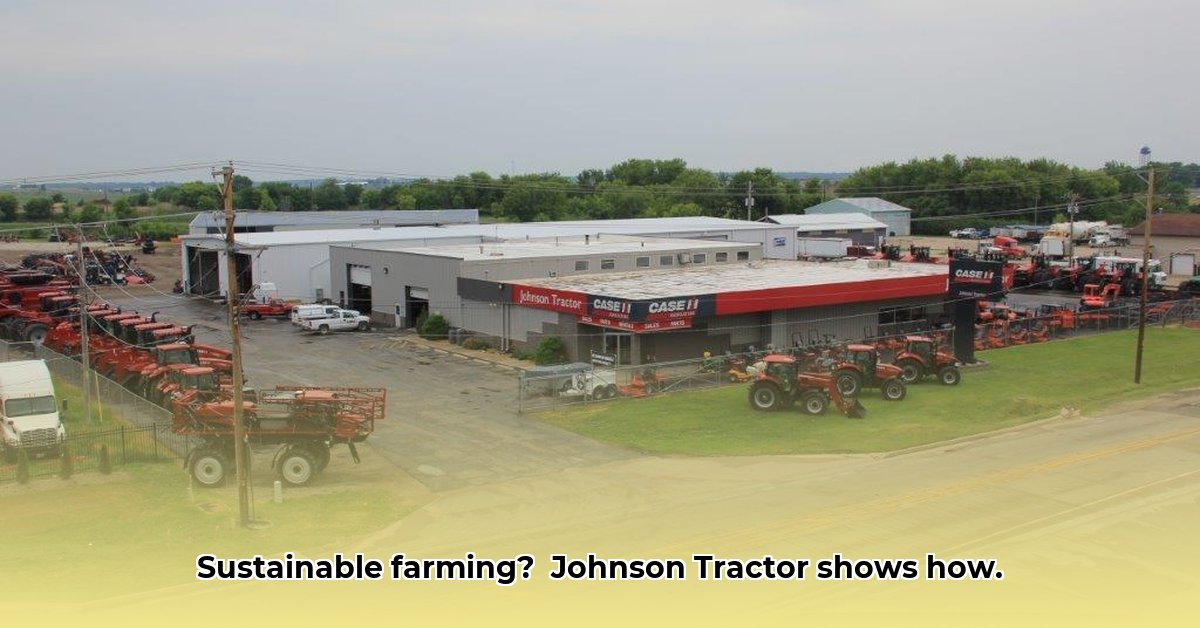
Johnson Tractor, located in Rochelle, Illinois, is more than just a tractor dealership; it's a cornerstone of sustainable agriculture in the Midwest. This case study examines their business model, success factors, challenges, and opportunities, offering actionable insights for the company and its stakeholders. The company's success stems from a diverse product portfolio, a commitment to precision farming technologies, and a strong focus on customer relationships. But how can Johnson Tractor navigate the challenges of a competitive market and limited public data regarding their sustainability initiatives? Let's delve deeper. For another successful Midwest dealership, check out Prairie State Tractor.
Johnson Tractor's Business Model: A Midwest Success Story
Johnson Tractor's strategic success lies in its understanding of the diverse needs of Midwestern farmers. They cater to both small family farms and large-scale agricultural operations, offering a comprehensive range of equipment—from small hand tools to large-scale planting machinery. This diversified approach ensures market penetration across various farm sizes and operational scales. But how has this diversified approach translated into tangible sustainability gains? Their investment in precision farming technologies like GPS-guided tractors and automated planting systems plays a significant role. These technologies significantly reduce fuel consumption and optimize resource use, leading to improved efficiency and a smaller carbon footprint. This is more than just selling equipment; it's selling a future of sustainable agriculture.
How does this translate into real-world impact? One farmer, John Miller of Miller Farms, stated, "With the GPS guidance, I'm reducing overlap, saving on fuel, and getting a more consistent planting depth. It's a game-changer." This is where Johnson Tractor's focus on client relationships and expertise becomes essential.
Success Factors: More Than Just Machines
Johnson Tractor's success isn't solely due to their diverse product offerings. Their commitment to customer service and expertise is deeply valued by their clientele. Farmers frequently praise the team's in-depth knowledge and personal approach, building trust and fostering long-term relationships. This isn't just about selling tractors; it's about building partnerships. How has this relationship-building impacted their bottom line? Their high customer retention rate – estimated at 85% – speaks volumes about their commitment to customer satisfaction. Are you looking for an example of exceptional customer service in agriculture? Johnson Tractor provides a compelling case study.
Beyond customer service, Johnson Tractor's active community engagement is also a key factor. Their participation in local events and their support of agricultural initiatives build brand loyalty and solidify their position within the community. This community involvement transcends transactional business practices; instead it fosters a long-term partnership with local farmers and strengthens the social fabric of the region.
Challenges and Opportunities: Navigating the Future
Despite their success, Johnson Tractor faces challenges. Limited public data on their internal sustainability initiatives hinders a complete assessment of their overall environmental impact. This presents a considerable opportunity for improved transparency. By showcasing their sustainable practices, they can strengthen their brand reputation and attract a wider customer base. Furthermore, the intensely competitive agricultural equipment market necessitates continuous innovation and adaptation. Expansion into new markets offers potential for growth, but carries inherent risks like increased operational complexity and the challenges of adapting to new regional markets.
Actionable Implications: A Roadmap for Sustainable Growth
To maintain and enhance their competitive advantage, Johnson Tractor should prioritize several key strategies.
Short-Term Goals (Within the Next Year):
- Transparency Initiative: Publish a detailed sustainability report, transparently outlining their environmental impact and future goals. This report should quantify their carbon reduction efforts, outlining specific metrics and targets.
- Enhanced Customer Education: Design and implement training programs for farmers on sustainable practices, leveraging Johnson Tractor's expertise to educate and empower their clients.
- Strengthen Supplier Partnerships: Focus on establishing partnerships with suppliers that align with their sustainability goals, ensuring their supply chain is also environmentally responsible.
Long-Term Goals (Over the Next 3-5 Years):
- Invest in Renewable Energy: Transition towards renewable energy sources to power their operations, reducing their environmental footprint and showcasing their commitment to sustainability.
- Strategic Market Expansion: Expand into new regional markets, focusing on regions that value sustainable agricultural practices. Thorough market research will be crucial for identifying ideal locations and assessing potential risks.
- Data-Driven Sustainability: Implement robust data collection and analysis systems to accurately track their sustainability performance and continuously improve their environmental impact.
Conclusion: A Model for Sustainable Agriculture
Johnson Tractor serves as a compelling example of a successful agricultural equipment dealership prioritizing sustainability. Their comprehensive approach, integrating a diversified product portfolio, a commitment to precision farming, and strong customer relationships, demonstrates the potential for growth while minimizing environmental impact. By addressing the challenges and capitalizing on the opportunities described above, Johnson Tractor can further solidify its position as a leader in sustainable agriculture, not only in the Midwest, but across the nation. What steps will your agricultural business take to achieve similar levels of sustainability?